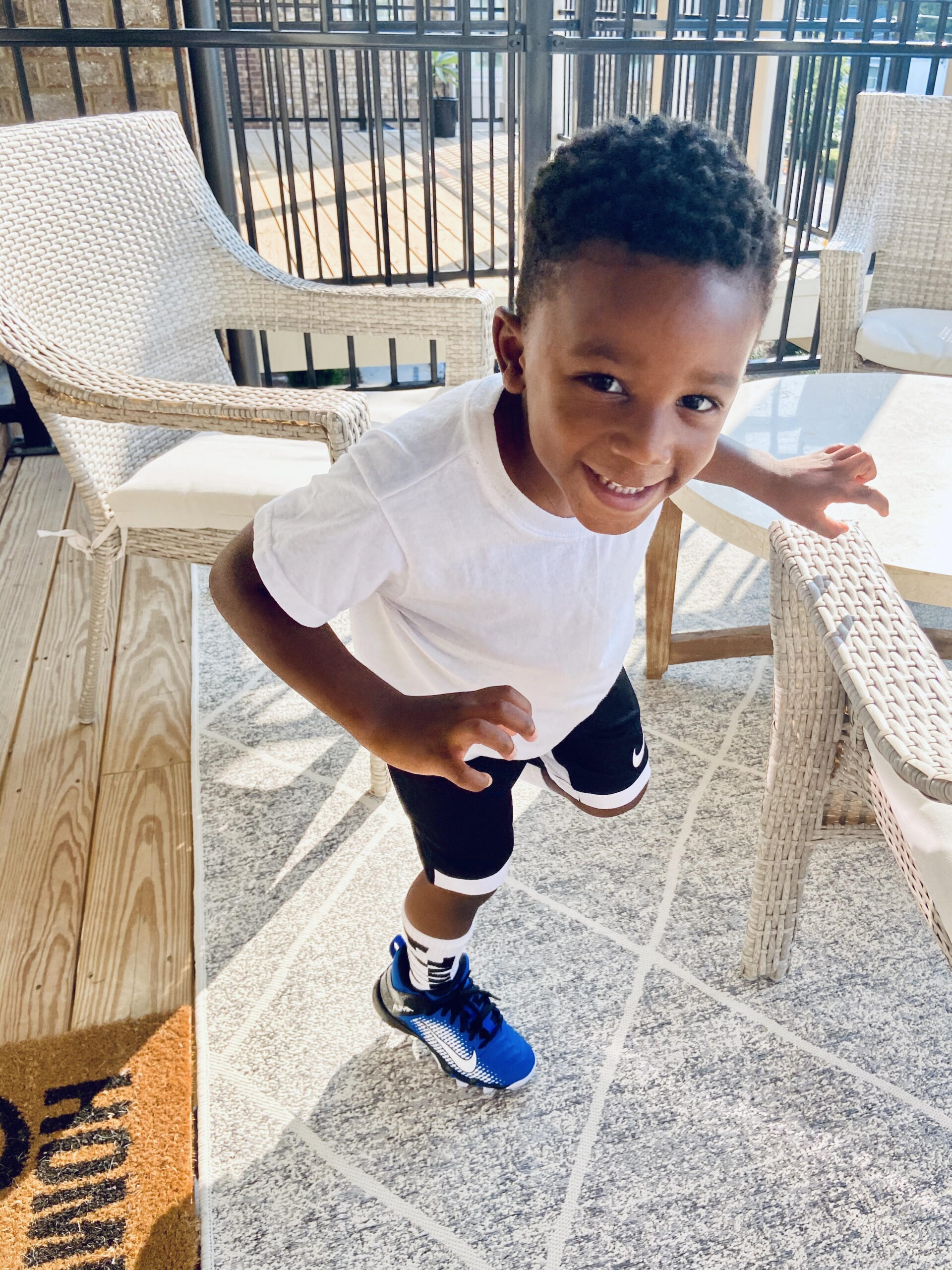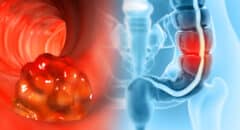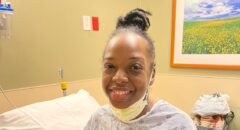
Pregnancy is often a time of joy and anticipation, but for some women, it can also mask symptoms of a silent threat: colorectal cancer (CRC). Symptoms like changes in bowel habits, abdominal discomfort, and fatigue can easily be attributed to the rigors of pregnancy or postpartum recovery. A startling trend is emerging – CRC rates are on the rise among younger adults, with a 15 percent increase in cases among those aged 18-50 since 2004.
Georgia native Jenna Scott knows all too well about this concerning trend. Scott’s journey with colorectal cancer began unexpectedly during her pregnancy with symptoms that started as seemingly normal discomforts, turning into a harrowing experience of misdiagnoses and delays in treatment.
“The symptoms first appeared when I was about seven months pregnant, and I vividly recall the moment I realized something was wrong. It was during a trip to the restroom, which turned into a scene I can only describe as a bloodbath,” Scott tells BlackDoctor.org. “Naturally, my immediate concern was for my baby’s well-being. We promptly contacted my doctor, who reassured me that everything was fine and attributed the bleeding to hemorrhoids—a common issue during pregnancy.”
RELATED: “No More ‘Do It Later’”: Deondre Williams on Life After Colon Cancer
As the discomfort persisted, Scott began to experience severe abdominal pains and insomnia. Although she raised concerns, her symptoms were once again dismissed as typical pregnancy symptoms.

“Trusting my healthcare providers, all of whom were white males, I accepted their explanations, believing that my experiences were just part of the pregnancy journey. Despite ongoing symptoms postpartum, including persistent bleeding, I was repeatedly assured that all was well,” Scott adds. “I feel like the least my obstetrician-gynecologist could have done was provide me with information or suggest precautions. It felt like they put me in a box—seeing a young African American woman in the office for the first time pregnant and assuming everything was fine because I was just pregnant. There’s this stereotype that we might exaggerate more than others, but I was not exaggerating at all.”
After giving birth to her son, Scott continued to experience symptoms. Despite seeking help from her healthcare providers, she faced a series of misdiagnoses and delays in receiving appropriate care. It wasn’t until a year after her initial symptoms and the decision to seek a second opinion that Scott was finally diagnosed with stage 4 colorectal cancer.

“This decision led to a series of tests, including blood work and medications to rule out various conditions like IBS. However, when these treatments failed to alleviate my symptoms, I was referred to a GI [gastroenterologist] specialist. It was during the subsequent colonoscopy that my world was turned upside down with a diagnosis that no one, including myself, anticipated: cancer,” Scott recalls. “It was about three weeks between my diagnosis and meeting my oncologist for the first time. We had thought it might be stage 1 or 2, but my oncologist’s first words were, ‘You have stage 4,’ a complete shock. After that, everything seemed to blur together.”
Scott’s initial reaction to the diagnosis was a mix of shock and disbelief that her life was about to change so drastically.

“I convinced myself that this was just a minor setback, akin to a cold, and that I would soon return to my normal routine,” she shares, adding that all of her thoughts were consumed by the fear that her son wouldn’t remember her if something happened to her.
Fortunately, Scott had a strong support system by her side.
“I remember leaving the appointment and deciding to visit a sunflower patch near my house—a place I’d never been before. It was a simple, beautiful moment, picking sunflowers, taking pictures, and enjoying the day with my mom and husband…Their support has been invaluable,” Jenna adds. “My husband, in particular, has been incredible. We were still newlyweds when I was diagnosed, and our son was just a baby. Despite this, he stepped up immediately, researching tirelessly and accompanying me to every doctor’s appointment. He never missed a round of chemo until COVID restrictions forced him to stay home. For three years, he was my rock. He also took on more parenting duties, and while I initially struggled with feelings of jealousy and inadequacy, seeing him excel as a father was a blessing in disguise. My mom, too, played a crucial role, cooking meals for us and ensuring we were always taken care of. Our friends and extended family rallied around us, offering support in various forms, from gift cards to helping around the house. My support system has been unwavering, and I am immensely grateful for their love and care.”

After undergoing a grueling year of chemotherapy and a triple surgery, where a portion of her colon, parts of her lungs, and gallbladder were removed, she experienced a series of setbacks, including inconclusive scans and a recurrence of cancer in her liver and lungs.
RELATED: Know Your Risk: 10 Things Blacks Need to Know About Colorectal Cancer
“After completing chemotherapy, I went through nine months of inconclusive scans, getting scanned every six to eight weeks. Then, right before Christmas of 2018, I received a call to come to the hospital; the cancer had returned in my liver and spread to my lungs. I immediately resumed treatment in the new year, undergoing another year of chemotherapy. However, I’m skipping over something significant. After my initial triple surgery in 2017, I experienced complications and went to the ER. The doctors initially dismissed my symptoms, saying I just had a bit of fluid buildup, and sent me home. But I felt like I was dying, spending many nights curled up in the bathtub, feeling like it was the only place I could find relief. About four weeks later, I returned to the hospital, and this time, they found 600 milliliters of infected fluid that had built up in my chest, abdomen, and back. I couldn’t understand why no one was listening to me until things got really bad. It felt unfair, and I kept wondering what I had done wrong,” Scott shares.

Despite these challenges, Scott persevered, undergoing further treatment and surgeries, including a battle with melanoma on her heel.
“Eventually, I stopped the maintenance therapy, and life seemed to improve. But right before Christmas of 2022, I received another call from my doctor, this time telling me the cancer had returned to the lymph nodes in my chest. I delayed treatment to enjoy a perfect Christmas with my family but started again at the beginning of 2023,” Scott says.

“One thing that all my doctors have consistently pointed out is my attitude, which they say has been 50% of my battle. I remain super positive about everything; if they recommend something, I do it with a smile. Even during chemotherapy, I always have a smile on my face, chatting with other patients and keeping a positive vibe. When doctors say I need another surgery, I’m like, ‘Okay, let’s do it.’ I don’t ask many questions or get afraid because I’ve built trust with my doctors. I would advise anyone facing tough news not to let it consume them. Take it with a grain of salt and always find the light. Every day, I wake up and find something positive about my journey, even if I’m crying while doing so. Crying is therapeutic for me, but staying positive, no matter what the news, has been crucial for my mental and physical well-being.”
Scott is currently undergoing another round of treatments and although the latest round of treatment has been difficult for her body to handle and consists of debilitating side effects and relentless demands, she remains determined to continue living her life to the fullest.
“Despite all this, I try to focus on the positive—I’m still here. My doctor says I’m a rare case for having gone through so much. To look at me, you wouldn’t even know I’m sick, except for my shorter hair. Throughout this journey, I’ve continued working full-time as an executive at a tech startup, being a mom, and traveling the world with my family. Most of the time, it feels like I’m living a double life—on one side, a cancer patient enduring treatment, and on the other, a professional thriving in my career. It’s a challenging balance, but knowing I’m making a difference in the world keeps me going,” Scott adds.

One way Scott is making a difference is through her commitment to raising awareness about colorectal cancer, particularly among young people and pregnant women. She is currently a member of the Never to Young Colorectal Cancer Alliance Advisory Board.
“The message I want to convey is for young people to advocate for themselves. Doctors only know so much about you, and sometimes their understanding is limited by their perspective and experiences,” Scott shares. “Doctors should make it okay for people to advocate for themselves and offer other avenues for them to stay on top of their health. Personally, I never saw any information in my doctor’s office about colon cancer until after I was diagnosed. I didn’t even know what it was until then. When I read about it, it said the average age was a 72-year-old white male, which made no sense to me. It’s important to raise awareness because the rates are steadily increasing among Black and young individuals for colon cancer.”
“It’s essential to get a second opinion and trust your own body. No one should dictate what’s happening in your body; you’re the one who knows it best. I’m glad the screening age has been lowered to 45, but it doesn’t change my experience from seven years ago. I want young people to understand that they’re not invincible, as I once thought. Despite living a healthy lifestyle, cancer still happened to me. However, I believe that my healthy habits and active lifestyle have helped me endure the challenges of surgeries and chemotherapy. It’s important to stay informed, ask questions, and challenge the information you receive to ensure you’re getting the best care possible,” Scott concludes.








